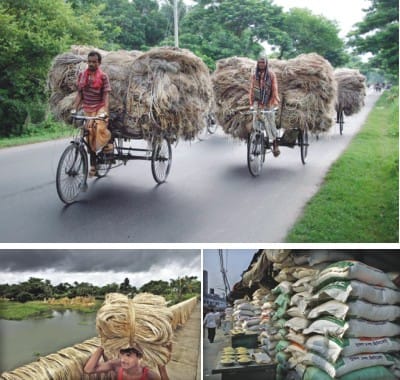Must use of jute sacks in packaging ignored

Dried jute is being transported in rickshaw vans for sale in markets in Rajshahi(top). (Bottom left), A man carries jute on his head. (Bottom right), plastic sacks are being used to pack rice instead of using jute bags. Photo: STAR
A law that makes packing of domestic commodities with jute sacks a must is largely ignored as traders find the natural fibre costlier and difficult to maintain quality.
The main reason behind poor compliance is the high prices of jute bags and sacks in comparison to synthetic ones. Other reasons include a lack of availability and a risk of deterioration in the quality of the goods being packed because the fabric allows the entry of dust and moisture into items like rice, wheat and sugar, according to traders.
"Our packaging costs will increase for the compulsory use of jute bags. This will increase the prices of the commodities at consumer levels,” Biswajit Saha, general manager of City Group of Industries, a major commodity processor, told earlier.
The price of a 50-kilogram jute sack is Tk 60-70; the price for a synthetic polypropylene (PP) sack of the same size is a third of that, according to Saha.
Moreover, there is a lack of supply of jute bags in the market, said Saha. There is demand for 1.5 lakh sacks a day in the city to pack refined sugar, flour and poultry feed. To ensure supply, the commodity processor makes PP bags on its own.
Except for state-run Department of Food and Bangladesh Agricultural Development Corporation (BADC), neither other public sector agencies nor private businesses are yet to fully comply with the law.
In October last year, the government gazetted a law that made it necessary for commodity dealers to use jute bags for packaging, to boost local consumption of jute and reduce dependence on exports.
Currently, Bangladesh exports about 20 lakh bales (1 bale equals 180 kilograms) a year as raw jute out of an annual production of 60-65 lakh bales. The rest raw jute is used in local factories to make yarn and jute goods, more than 80 percent of which is exported.
This dependence on exports makes the whole industry, providing jobs to 150,000 factory workers and tens of thousands of farmers, susceptible to price shocks in case of global demand falls.
This year, exports have already started to slow amid worries of a double dip in the advanced economies and turmoil in the Middle East, leading to a slump in the prices of raw jute at the farmer level.
Implementation of a mandatory packaging law could help increase domestic demand and thus provide support to farmers to withstand the fall in prices, said a senior official of Bangladesh Jute Mills Corporation (BJMC), seeking anonymity.
To implement the law, the textiles and jute ministry initially planned to ensure the use of jute sacks by state agencies BADC, Department of Food, Bangladesh Chemical Industries Corporation (BCIC) and Bangladesh Sugar and Food Industries Corporation (BSFIC).
Till date, the fertiliser and cement processor BCIC and sugar producing entity BSFIC is yet to fully use jute bags for packaging, said Md Ashraful Moqbul, secretary of the textiles and jute ministry.
BCIC officials said the agency has started using jute bags to pack urea fertiliser and it will further increase the use of jute bags in phases.
"We trying to ensure the use of jute bags even though there is a price difference between jute and PP bags," said Dipak Ranjan Datta, director commercial of BCIC.
On the other hand, BSFIC plans to buy jute bags from this year, said BSFIC Secretary Ferdous Begum.
For the private sector, the ministry undertook a motivational approach, instead of enforcing a law. But that too did not help increase use.
"Everyone complains of the higher prices of the jute bags in comparison to the synthetic ones,” said Moqbul, sharing his experiences from a meeting with rice millers earlier. "We will sit with them again.”
Nirod Boron Saha, president of the rice wholesalers' body at one of the major rice selling hubs, Naogaon Dhanno-Chal Aratdar O Babosayee Samity, said traders and milers use jute bags to carry paddy.
But they are reluctant to use jute bags for rice because of a risk of deterioration in the quality of rice, he said.
"Air is more likely to enter the jute bags than the synthetic ones. That is why rice cannot be preserved for a long time in jute bags,” he said.
The rice trader at one of the main rice wholesale markets in the north said the moisture in the air causes the rice to fade in colour and attracts insects. “As a result, it becomes difficult to sell the produce at consumer levels.”
He also claimed that the government did not consult the rice traders and millers before mandating the use to jute bags for packaging.
"Any law should be for the benefit of the people. We use the bags and know where it can be used and where it cannot. The government could have discussed it with us, before enacting the law," he added.
Even though the initial cost of a jute bag is high, it can be used several times, the BJMC top official said.
"Jute sacks can be used four times, while a synthetic one can be used only once. If you take note of usage, the actual cost of purchase is lower than what is claimed,” he said.
In addition, the percentage of leakage is also low for jute bags than synthetic bags.
"If anyone uses hooks on synthetic bags, the bags leak and cannot be used. That is not the case for jute bags. There will be less pilferage in bags made of jute when hooks were used.”
On issues over availability, he said the factories can supply bags if commodity processors place orders in advance.
"Above all, the bags should be used for its eco-friendliness and long term sustainable benefits, not from a profit or loss perspective," he said.
"The use of jute bags may increase prices by a few cents, but considering the benefits of jute and risks of environmental degradation for the use of synthetic bags, jute should be used," said the official.
The ministry wants voluntary compliance with the law. "As it is not working, we will have to go enforce it," said Moqbul, citing that the jute department has recently framed a draft to enforce the law.
"We will finalise it as soon as possible," he said. "We will also write to the home ministry to include a provision to take action against non-compliers of the law with the mobile courts."

 For all latest news, follow The Daily Star's Google News channel.
For all latest news, follow The Daily Star's Google News channel. 



Comments